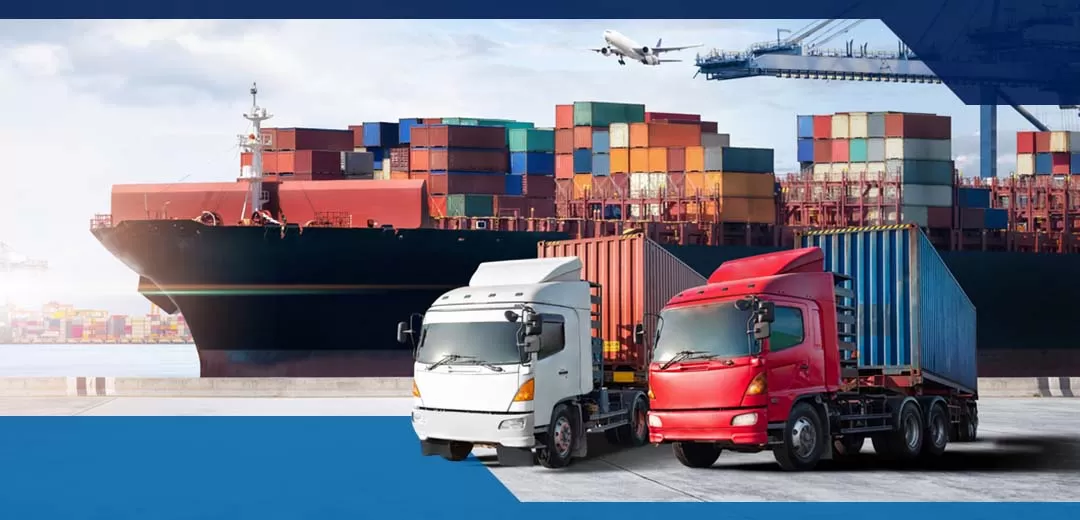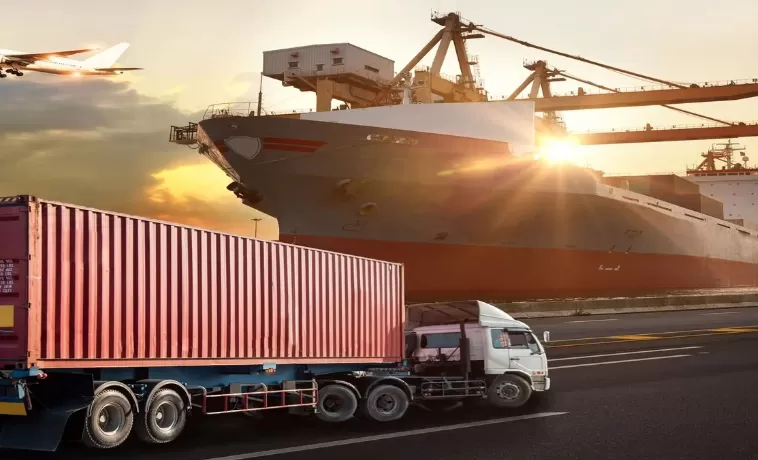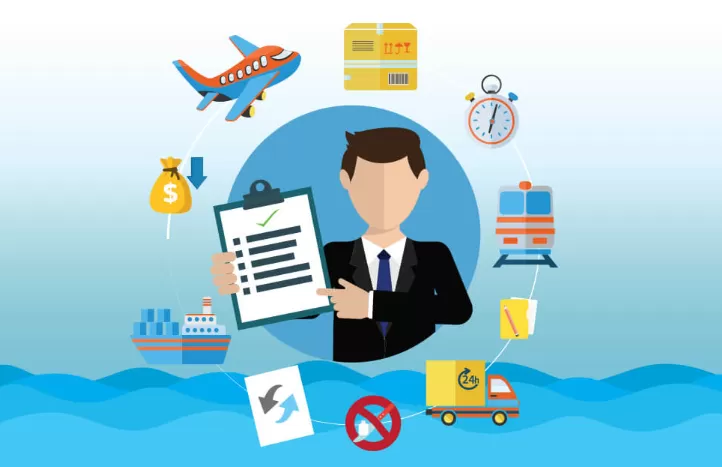Navigating the complexities of international shipping can feel like orchestrating a symphony without a score. Between volatile freight rates, labyrinthine customs regulations, and the ever-present risk of delays, managing your global supply chain in-house is a resource-intensive endeavor. The question isn't just "What is a freight forwarder?" but "How can a strategic partnership with one become a tangible competitive advantage for my business?"
This guide moves beyond a simple list of benefits. We will dissect the true value proposition of freight forwarders, provide a framework to determine if you need one, and equip you with the knowledge to select a partner that drives growth, mitigates risk, and optimizes your entire logistics function.
1. Beyond Definitions: The Freight Forwarder as Your Logistics Conductor
At its core, a freight forwarder is not just a carrier; it's a Logistics Service Provider (LSP) that acts as your dedicated project manager for international shipments. They orchestrate the entire movement of your goods, leveraging their expertise and networks to ensure a seamless, efficient, and cost-effective journey from origin to destination.
Clarifying the Landscape: Forwarder vs. Courier vs. Going Solo
|
Feature
|
Freight Forwarder
|
Integrated Courier (e.g., DHL, UPS)
|
Self-Managed Shipping
|
|
Best For
|
Large volumes, complex goods, cost-sensitive shipments
|
Small parcels, urgent documents, standardized items
|
Companies with in-house logistics expertise and ample time
|
|
Scope
|
End-to-end: coordination of multiple carriers, customs, warehousing
|
Point-to-point: streamlined, standardized airport-to-airport
|
Entirely on you; you become the general contractor
|
|
Flexibility
|
High. Customized solutions, multi-modal options (air, sea, rail, road)
|
Low. Predetermined routes and services
|
Theoretical, but low in practice due to lack of network
|
|
Cost Structure
|
Negotiated rates based on volume; you pay for service + freight
|
Standard published rates; you pay for speed and convenience
|
Direct carrier rates + your internal manpower cost + risk of errors
|
|
Expertise
|
Deep knowledge of trade lanes, regulations, and risk mitigation
|
Expertise in fast, small-package delivery
|
Your team's knowledge, which may have gaps
|
Verdict: If your shipments involve pallets, full or partial container loads, or oversized items, or require special handling, a freight forwarder isn't an option—it's a necessity.
2.The Core Value Proposition:7 Advantages That Directly Impact Your Bottom Line
The advantages of using a freight forwarder extend far beyond simple transportation.
1.Real,Quantifiable Cost Savings(It's Not Just a Discount)
While volume-based discounts are a key benefit,the real savings are more nuanced.A proficient forwarder employsstrategic procurement.
Consolidation: They combine your Less-than-Container-Load(LCL)shipment with other clients'goods to create a Full Container Load(FCL),dramatically reducing your per-unit cost.
Mode Optimization:They analyze your timelines and costs to recommend the optimal mix—perhaps air freight to a hub port,then sea freight for the final leg(a practice calledair/sea).
Hidden Cost Avoidance:Their expertise prevents costly errors like incorrect HS codes,which can result in customs fines,storage fees,and demurrage charges that far exceed the freight cost itself.
2.Mastery of Compliance:Your Shield Against Risk
This is arguably the most critical value-add.Customs regulations are a minefield.A single error in documentation can lead to:
Goods being held at port,accruing daily storage fees.
Significant financial penalties.
Seizure of merchandise.
Damage to your importer security filing(ISF)bond,increasing future costs.
Freight forwarders have dedicated customs brokerage teams who ensure every "i" is dotted and every"t"is crossed on bills of lading,certificates of origin,and commercial invoices.They stay ahead of changing trade agreements and tariffs,ensuring you always claim the correct duty benefits.
3.Unmatched Flexibility and Problem-Solving
What happens when a port strike erupts,a vessel is oversold,or a typhoon closes a key airport?While you might scramble,a forwarder's global network kicks into gear.They have alternative routes,carrier relationships,and local agents on the ground to swiftly reroute your cargo,minimizing disruptions.Thissupply chain resilienceis invaluable and cannot be replicated internally without immense cost.
4.End-to-End Visibility Through Technology
Gone are the days of frantic phone calls and email chains.Modern forwarders provide integrated digital platforms that offer real-time, GPS-level tracking of your shipment.You're not just tracking a vessel;you see the container's movement from the factory,to the port,onto the ship,through customs,and onto the final delivery truck.This transparency allows for proactive management of your inventory and production schedules.
5.Expertise Tailored to Your Industry
The needs of an e-commerce business differ vastly from those of an automotive parts manufacturer or a pharmaceutical company.
For E-commerce:Forwarders understand Amazon FBA requirements(labeling,palletization),handle deconsolidation,and manage returns.
For Healthcare:They provide validated cold chain solutions with temperature monitoring and strict GDP compliance.
For Project Logistics:They engineer the transport of oversized,heavy,or high-value cargoes.
This niche expertise ensures your specific challenges are met with proven solutions.
6.The Power of a Single Point of Contact
Imagine coordinating with a trucking company,a ocean carrier,a customs broker,and a warehouse—each with their own contracts,points of contact,and invoices.A forwarder simplifies this intoone relationship,one contract,and one point of accountability.This saves you countless hours of administrative overhead and miscommunication.
7.Strategic Warehousing and Distribution
Many forwarders offer value-added services like warehousing near key ports,pick-and-pack,labeling,and quality control.This allows forcross-dockingand inventory management,turning your forwarder into a strategic distribution partner that helps you fulfill orders faster and more efficiently.
3.The Decision Matrix:Do You ReallyNeed a Freight Forwarder?
Ask yourself these questions.If you answer"yes"to any,a forwarder is a prudent investment:
Volume&Frequency:Do you ship more than 2-3 pallets or 10 CBM (cubic meters) per month internationally?
Complexity:Do your shipments require special handling(temperature-sensitive,hazardous,high-value,oversized)?
Regulatory Knowledge:Are you 100%confident in your team's ability to navigate import/export regulations for every country you operate in?
Time & Resources: Do you have dedicated,experienced logistics staff to manage the entire process,or is it a distraction from your core business?
Risk Tolerance:Can your business absorb the financial impact of a shipment being delayed by weeks or hit with unexpected fines?
4. Selecting Your Partner: A Framework for Success
Choosing a forwarder is a strategic decision. Look beyond price alone.
Industry-Specific Experience: Do they have case studies or references from your sector?
Network Strength: Ask about their agent network in your key destination countries. Are they owned offices or partners? Owned offices often provide more consistent service.
Technology Stack: Request a demo of their tracking and reporting platform. Is it intuitive and powerful?
Financial Stability: A forwarder pays carriers on your behalf. Their financial health is critical to your supply chain's stability.
Cultural Fit: You will rely on them in crises. Are they responsive, proactive, and communicative? Do they feel like a true extension of your team?
5. Conclusion: From Cost Center to Strategic Enabler
A freight forwarder is more than a vendor; it's a strategic partner that transforms logistics from a complex cost center into a streamlined, reliable, and competitive engine for your global growth. The investment in their expertise pays dividends in cost savings,risk mitigation,and invaluable peace of mind.
Ready to experience the difference a true partnership can make? Our logistics experts specialize in crafting tailored solutions for businesses like yours. Contact us today for a no-obligation consultation and data-driven analysis of your supply chain.
FAQ
Q:What happens if my goods are damaged during transit?What is the process for filing a claim?
A:The first step is always to note any damage on the delivery receipt before signing.Immediately inform your freight forwarder.They will act as your advocate,coordinating with the actual carrier(airline,shipping line,trucking company)to file a claim on your behalf.They will guide you through the required documentation,which typically includes photos,the original bill of lading,and the commercial invoice.Their expertise is crucial in navigating the carriers'often complex claims procedures and timelines.
Q:Are there items that freight forwarders absolutely cannot ship?
A:Yes.While forwarders handle a vast array of goods,there are universal restrictions.These typically include hazardous materials that are forbidden for transport by international law(e.g.,certain explosives,radioactive materials),counterfeit goods,and illegal items like narcotics.Additionally,many forwarders have their own restrictions on items like high-value jewelry,cash,live animals,or weapons due to the extreme risk involved.Always disclose your cargo's exact nature upfront.
Q:How does a freight forwarder handle a situation where there's a General Average declaration?
A:This is a classic example of where a forwarder's expertise is critical.General Average is a maritime law principle where all cargo owners on a voyage proportionally share losses after a major incident(e.g.,a fire,ship grounding).If declared,the carrier will secure all cargo until guarantees are paid.Your forwarder will immediately notify you,work with specialized Average adjusters to calculate your contribution,and help you arrange the required security bond or payment to release your goods,preventing massive delays.
Q:Can I use my own customs broker in the destination country,or must I use yours?
A:This is a common question.While forwarders often have preferred or partnered brokers for efficiency,you generally have the right to appoint your own broker(known as a"self-filing"instruction).However,you must communicate this choice clearly and early in the process.Using your forwarder's network often streamlines communication and accountability,while using your own broker requires excellent coordination between the two separate entities to ensure smooth handoff and clearance.
Q:What are"accessorial charges,"and will I be responsible for them?
A:Accessorial charges are fees for services beyond the standard port-to-port or door-to-door movement.Examples include detention(holding the container too long at your facility),demurrage(holding it too long at the port),storage,lumper fees(for manual unloading),or re-weighing/re-stuffing fees.A reputable forwarder will proactively warn you about potential accessorials.You are responsible for charges incurred due to your instructions or delays,which is why understanding Incoterms®rules is vital.
Q:How do you handle the logistics for a trade show or a tight product launch deadline?
A:This requires a specialized"expedited"or"project logistics"approach.We would typically recommend air freight for speed and build in buffer time.Critical steps include securing confirmed bookings on flights well in advance,arranging priority off-loading at destination,and having a dedicated team on standby for customs clearance.We often coordinate directly with the show's logistics contractor to ensure seamless delivery right to your booth.Communication and meticulous planning are everything for these high-stakes shipments.
Q:My product is new and I'm unsure how to classify it for customs.Can you help?
A:Absolutely.Determining the correct Harmonized System(HS)code is a core part of our compliance service.We will analyze your product's composition,function,and manufacturing materials based on the information you provide.However,for legal reasons,the final determination and responsibility for the correct code always rests with the importer of record(usually you or your entity).We provide the expert guidance to ensure you make an informed and compliant decision.
Q:Do you offer cargo insurance,and is it worth it?
A:We strongly recommend it and can either arrange it for you or connect you with reputable marine cargo insurance providers.Carrier liability is extremely limited by international conventions(often to a shockingly low value per kilogram).Insurance protects you against the full value of your goods in case of theft,damage,or total loss.For most businesses,the relatively small premium is a wise investment for peace of mind against catastrophic financial loss.
Q:Can you ship personal effects and household goods for an international relocation?
A:Many freight forwarders,including us,have a dedicated division or partners that handle this.International moving involves specialized packing,customs documentation for used personal effects(which often qualify for duty-free import),and coordination with destination agents.The process is different from standard commercial freight,so it's essential to work with a provider experienced in relocations to avoid complications.

 EN
EN
 FR
FR
 ES
ES
 JA
JA
 PT
PT
 RU
RU
 AR
AR







